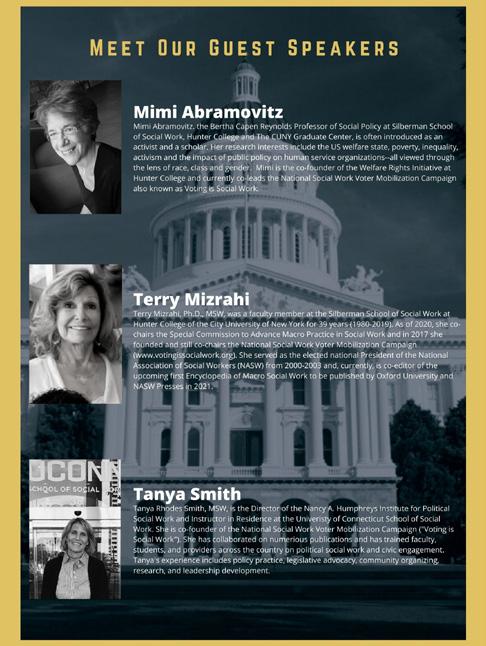
3 minute read
Voting in 2020, Documentary and Discussion Series
Collaboration and innovation in a season of multiple pandemics
By Ria Brazil Jones and Danielle Breidung
Voter engagement has been an important focus for social work across the country throughout 2020, a year in which the need for increased civic participation proved to be as important as mining solutions for the multiple pandemics of our time: COVID-19, systemic inequity, and the weakened guardrails of democracy. The School of Social Work’s Athens and Gwinnett campuses joint Student Faculty Committees (SFC) contributed to this conversation by collaboratively hosting a virtual Voting in 2020 Documentary and Discussion series.
While Ria Brazil Jones, Chair of the SFC in Gwinnett, and her fellow committee members were envisioning a discussion series geared toward political social work and voter engagement, Voices for Change Chair of the SFC in Athens, Danielle Breidung, was imagining a social justice documentary series accompanied by virtual discussions. When they learned of each other’s plans, Jones and Breidung decided to merge their ideas and leverage their collective insights and enthusiasm.
These budding advocates quickly set out to organize virtual events that would not only engage SSW students, faculty, staff, and alumni, but also move the study of social work into action. Students, faculty, and staff donated their time, leveraged their relationships, and contributed their expertise to this series, which ultimately focused on the importance of political social work, voter participation (at the federal and local levels), sustained civic engagement, and the naming of inequities and systems of oppression which impact those endeavors. In total, more than 700 people screened three relevant documentaries and joined real-time, virtual discussions with experts from across the country.
The Voting in 2020 Documentary and Discussion series set the stage with a screening of Lillian Smith: Breaking the Silence on September 9, 2020. The screening was followed by a panel that included filmmaker Hal Jacobs and subject-matter experts Drs. Diane Roberts, Vicki Crawford, and Jane McPherson.
On October 7, 2020, the series continued with Part I: Voter Suppression, featuring a discussion with Dr. June Gary Hopps and the documentary, Suppressed. Close behind was the launch of Part II: Parham Policy Day Lecture on October 21, 2020, which was a collaboration between students and Dr. June Gary Hopps, UGA’s Thomas M. “Jim” Parham Professor of Family and Children Studies, as part of her annual Parham Policy series. Part II keynote speaker, Dr. Andra Gillespie of Emory University, discussed the voting trends of women & people of color and participants were encouraged to view the documentary John Lewis: Get in the Way.

Flyer for Part II: Parham Policy Day Lecture featuring keynote speaker Andra Gillespie of Emory University.
Part III: A Post-Election Debrief involved collegial conversation and took place shortly after election day on November 11, 2020.
Finally, Part IV: 2021 Social Work in Action was a post-inauguration workshop held on January 25, 2021. This culminating event showcased the experiences and wisdom of Dr. Mimi Abramovitz and Dr. Terry Mizrahi (Hunter College), and Tanya Smith, MSW (University of Connecticut) and facilitated conversations about ways social workers can advocate for sustained civic engagement.
Below: Flyers announcing the Voting in 2020 Documentary and Discussion Series Part IV hosted by the Athens and Gwinnett Student Faculty Committees.


Breidung, a combined-track student with experience consulting for nonprofit organizations, firmly believes in the power of technology to offer more convenient and equitable access to information as well as new opportunities for collaboration. “Even after the need for physical distancing subsides, I hope that the School of Social Work and future SFCs will continue to use virtual platforms to host at least some of their events,” she says. Jones, a micro-practice student with a passion for holding space, feels reinvigorated by the experience of organizing at the mezzo and macro levels. The series gave her the opportunity to co-curate space for conversation and offer social workers of diverse backgrounds a seat at the (virtual) table to imagine solutions together. She says, “My hope going forward is that students will continue to engage their communities in discussions [about the present moment], and that it mobilizes their social work into action.”










